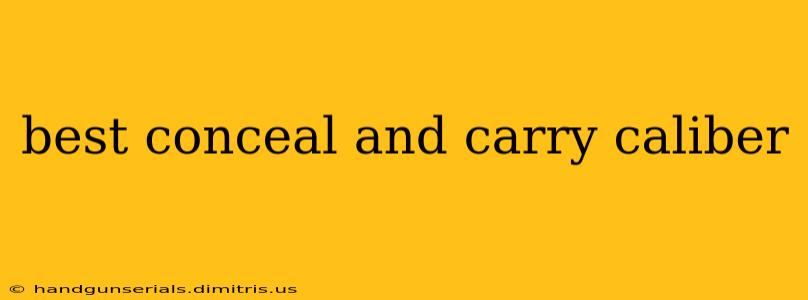Choosing the best concealed carry caliber is a deeply personal decision, and there's no single "best" option that fits everyone. The ideal caliber depends heavily on your physical capabilities, shooting experience, intended use, and comfort level. This guide will explore popular choices, their advantages and disadvantages, and help you make an informed decision.
Factors to Consider When Choosing a Concealed Carry Caliber
Before diving into specific calibers, let's outline the key factors influencing your choice:
- Shootability: How easily can you handle the recoil and accurately shoot the firearm? A powerful caliber might be less effective in your hands if you can't consistently hit your target.
- Stopping Power: This refers to the round's ability to incapacitate a threat. Larger calibers generally offer more stopping power, but shot placement remains paramount.
- Concealability: The size and weight of the firearm significantly impact how easily it can be concealed. Smaller calibers often translate to smaller, lighter guns.
- Capacity: The number of rounds your firearm holds influences how many shots you have available in a self-defense situation.
- Availability and Cost: Consider the cost of ammunition and its availability. Certain calibers might be more expensive or harder to find.
- Personal Preference: Your comfort level and confidence with a particular caliber are crucial.
Popular Concealed Carry Calibers: A Detailed Comparison
Let's examine some of the most prevalent concealed carry calibers:
9mm
- Pros: High capacity magazines, relatively low recoil, widely available ammunition, affordable, and a proven effective self-defense round.
- Cons: May require multiple hits for effective stopping power compared to larger calibers.
.45 ACP
- Pros: Significant stopping power, large bullet diameter creates substantial wound cavities.
- Cons: High recoil, lower capacity magazines, heavier and bulkier firearms, more expensive ammunition.
.40 S&W
- Pros: Good balance between stopping power and recoil, relatively high capacity.
- Cons: More recoil than 9mm, can be more expensive than 9mm ammunition.
.380 ACP
- Pros: Very lightweight and easy to conceal, low recoil, manageable for smaller individuals.
- Cons: Lower stopping power than other calibers, limited magazine capacity.
10mm Auto
- Pros: High stopping power, flat shooting, good accuracy.
- Cons: Significant recoil, can be challenging for some shooters, less common than other calibers, more expensive ammo.
Beyond Caliber: Other Crucial Considerations
While caliber is important, it's not the only factor. Here are other elements to evaluate:
- Firearm Reliability: Choose a reliable handgun from a reputable manufacturer.
- Training: Proper training is essential, regardless of the caliber you choose. Practice regularly to develop proficiency and accuracy.
- Holster Selection: A comfortable and secure holster is crucial for safe and convenient concealed carry.
- Legal Considerations: Understand and comply with all local, state, and federal laws concerning concealed carry.
Conclusion: Making the Right Choice
Selecting the best concealed carry caliber is a journey of self-discovery. Thoroughly research each caliber, consider your individual needs and limitations, and, most importantly, practice extensively with your chosen firearm. Consult with experienced firearms instructors and professionals to gain valuable insights and guidance. Remember, responsible gun ownership includes continuous learning and a commitment to safety. The goal is to select a caliber and firearm that you are comfortable and confident using, ensuring your personal safety in any situation.

